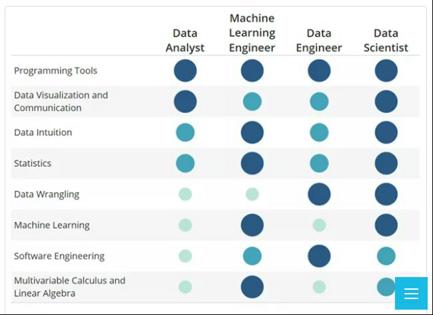ROAD MAP TO BECOME A DATA SCIENTIST
We're very excited to have you join us to help you learn about the essentials and the starting steps of becoming a data scientist or let’s call it as the first very phase of turning yourselves into a data analyst.
First of all, every one of us must know what actually data science is and what exactly does a data scientist do. Data science is often a confusing field which involves dozens of distinctive skills that define the profession as a constant struggle. In this 21st century of the highly technical world, everyone has their own curiosity towards the big data and its infinite amount of information which has to be sorted, interpreted and also applied for various purposes which sounds a bit complicated for an ordinary person to utilize and understand.
Now what exactly a data scientist do is that they assemble, organize and then analyze the data aiming to reach certain conclusions. This is basically done by visualizing the data which allows a user to look for clear patterns that wouldn't’t be recognizable if the information was introduced in the form of hard numbers on a spreadsheet. What they do is they create highly advanced algorithms that are used to determine patterns and acquire data from a confusing set of numbers and stats to something that can be useful for a business or an organization.
The job of a data scientist is a unique yet challenging career that offers a wide variety of daily tasks. As a data scientist, you may work for a wide variety of companies, coming up with solutions and information related to customer retainment, marketing, new products, or general business solutions. Data scientists uncover insights from massive amounts of data to help shape or meet business goals. They help companies to interpret and manage data and to solve complex problems.
One of the main doubts one must be undergoing right now is that what makes you eligible to become a data scientist isn’t it. Well your curiosity is what we are looking to answer. These are the three things that you should consider, if you’re aspiring to be a data scientist
1. You need to love coding.
2. Numbers and patterns should intrigue you, and not make you anxious.
3. Algorithms should cheer you up, instead of numbing you down.
To become a data scientist, one must at least have a bachelor’s degree. According to a research 73% of the professionals working in the industry have a graduate degree and 38% have a PhD. In order to know the core strengths of having to understand the data science course one must be familiar with the following subjects
• Detailed idea on computer science
• Probability Statistical analysis
• Simulation and hypothesis testing
• Mathematics
a) Calculus
b) Linear algebra
• Coding
a) Python
b) Machine learning along with ideas on AI
c) Programming
d) SQL database
e) Apache spark
f) Data visualization and communication
g) Data cleansing and manipulation
h) Hadoop platform
• Large sets of data handling and wrangling
• Quantitative problem-solving skills
• Working with unstructured data
Looking at its core, data science is the practice of looking for meaning in mass amounts of data. In-depth knowledge of at least one of these analytical tools, for data science R is generally preferred. You can use Python for almost all the steps involved in data science processes also It can take various formats of data so that you can easily import SQL tables into your code. Having an experience with Hive or Pig is also a strong selling point in the field of data science. Also, the familiarity with cloud tools such as Amazon S3 can also be highly advantageous. Even though NoSQL and Hadoop have become a huge element of data science so it is still anticipated that a candidate will be able to write and execute complex queries in SQL. Apache Spark is specifically designed for data science in order to help run its complicated algorithm faster.
Artificial intelligence includes neural networks, reinforcement learning, adversarial learning, etc. If you want to project yourself different from other data scientists then you need to know Machine learning techniques such as supervised machine learning, decision trees, and logistic regression in order to work with your data.
As a data scientist, you must be able to visualize data with the assessment of data visualization tools such as ggplot, d3.js and Matplottlib, and Tableau. You must also have the ability to understand and manipulate unstructured data from different platforms. Moreover, curiosity is one of the major skills you need to succeed along with communication skills as a data scientist.
The world of data science is an always-changing area, so people working in this field need to constantly update their skills. They are continually training to stay at the leading edge of information and technology.It is also said that data science is the new dimension for competitive businesses.

